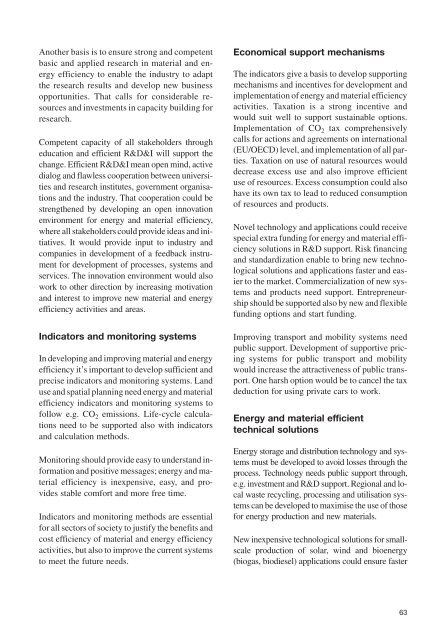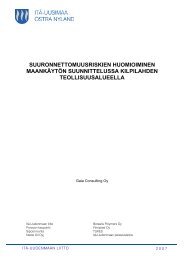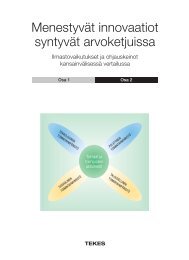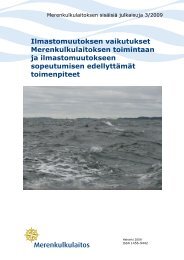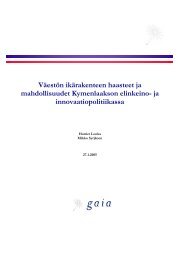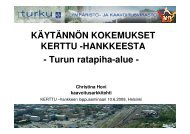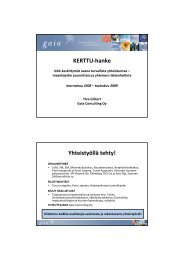227/08 Social challanges s the basis for foresight - Gaia
227/08 Social challanges s the basis for foresight - Gaia
227/08 Social challanges s the basis for foresight - Gaia
You also want an ePaper? Increase the reach of your titles
YUMPU automatically turns print PDFs into web optimized ePapers that Google loves.
Ano<strong>the</strong>r <strong>basis</strong> is to ensure strong and competent<br />
basic and applied research in material and energy<br />
efficiency to enable <strong>the</strong> industry to adapt<br />
<strong>the</strong> research results and develop new business<br />
opportunities. That calls <strong>for</strong> considerable resources<br />
and investments in capacity building <strong>for</strong><br />
research.<br />
Competent capacity of all stakeholders through<br />
education and efficient R&D&I will support <strong>the</strong><br />
change. Efficient R&D&I mean open mind, active<br />
dialog and flawless cooperation between universities<br />
and research institutes, government organisations<br />
and <strong>the</strong> industry. That cooperation could be<br />
streng<strong>the</strong>ned by developing an open innovation<br />
environment <strong>for</strong> energy and material efficiency,<br />
where all stakeholders could provide ideas and initiatives.<br />
It would provide input to industry and<br />
companies in development of a feedback instrument<br />
<strong>for</strong> development of processes, systems and<br />
services. The innovation environment would also<br />
work to o<strong>the</strong>r direction by increasing motivation<br />
and interest to improve new material and energy<br />
efficiency activities and areas.<br />
Indicators and monitoring systems<br />
In developing and improving material and energy<br />
efficiency it’s important to develop sufficient and<br />
precise indicators and monitoring systems. Land<br />
use and spatial planning need energy and material<br />
efficiency indicators and monitoring systems to<br />
follow e.g. CO 2 emissions. Life-cycle calculations<br />
need to be supported also with indicators<br />
and calculation methods.<br />
Monitoring should provide easy to understand in<strong>for</strong>mation<br />
and positive messages; energy and material<br />
efficiency is inexpensive, easy, and provides<br />
stable com<strong>for</strong>t and more free time.<br />
Indicators and monitoring methods are essential<br />
<strong>for</strong> all sectors of society to justify <strong>the</strong> benefits and<br />
cost efficiency of material and energy efficiency<br />
activities, but also to improve <strong>the</strong> current systems<br />
to meet <strong>the</strong> future needs.<br />
Economical support mechanisms<br />
The indicators give a <strong>basis</strong> to develop supporting<br />
mechanisms and incentives <strong>for</strong> development and<br />
implementation of energy and material efficiency<br />
activities. Taxation is a strong incentive and<br />
would suit well to support sustainable options.<br />
Implementation of CO 2 tax comprehensively<br />
calls <strong>for</strong> actions and agreements on international<br />
(EU/OECD) level, and implementation of all parties.<br />
Taxation on use of natural resources would<br />
decrease excess use and also improve efficient<br />
use of resources. Excess consumption could also<br />
have its own tax to lead to reduced consumption<br />
of resources and products.<br />
Novel technology and applications could receive<br />
special extra funding <strong>for</strong> energy and material efficiency<br />
solutions in R&D support. Risk financing<br />
and standardization enable to bring new technological<br />
solutions and applications faster and easier<br />
to <strong>the</strong> market. Commercialization of new systems<br />
and products need support. Entrepreneurship<br />
should be supported also by new and flexible<br />
funding options and start funding.<br />
Improving transport and mobility systems need<br />
public support. Development of supportive pricing<br />
systems <strong>for</strong> public transport and mobility<br />
would increase <strong>the</strong> attractiveness of public transport.<br />
One harsh option would be to cancel <strong>the</strong> tax<br />
deduction <strong>for</strong> using private cars to work.<br />
Energy and material efficient<br />
technical solutions<br />
Energy storage and distribution technology and systems<br />
must be developed to avoid losses through <strong>the</strong><br />
process. Technology needs public support through,<br />
e.g. investment and R&D support. Regional and local<br />
waste recycling, processing and utilisation systems<br />
can be developed to maximise <strong>the</strong> use of those<br />
<strong>for</strong> energy production and new materials.<br />
New inexpensive technological solutions <strong>for</strong> smallscale<br />
production of solar, wind and bioenergy<br />
(biogas, biodiesel) applications could ensure faster<br />
63


